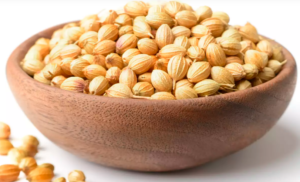 We offer our clients a wide array of Spices that is best known of its superior quality. These spices are processed in-house with latest technology and good quality processing machines. Our spices add good taste to food and also maintain nutrition. Moreover, our spices are also used for other purposes such as medicine, religious rituals, cosmetics, perfumery. These spices are processed under hygienic conditions and are completely free from harmful additives.
We offer our clients a wide array of Spices that is best known of its superior quality. These spices are processed in-house with latest technology and good quality processing machines. Our spices add good taste to food and also maintain nutrition. Moreover, our spices are also used for other purposes such as medicine, religious rituals, cosmetics, perfumery. These spices are processed under hygienic conditions and are completely free from harmful additives.
Coriander is commonly found both as whole dried seeds and in ground form. Roasting or heating the seeds in a dry pan heightens the flavour, aroma, and pungency. Ground coriander seed loses flavour quickly in storage and is best ground fresh. Coriander seed is a spice in garam masala and Indian curries which often employ the ground fruits in generous amounts together with cumin, acting as a thickener in a mixture called dhana jeera. Roasted coriander seeds, called dhana dal, are eaten as a snack. They are the main ingredient of the two south Indian dishes sambhar and rasam.
Outside of Asia, coriander seed is used widely in the process for pickling vegetables. In Germany and South Africa (see boerewors), the seeds are used while making sausages. In Russia and Central Europe, coriander seed is an occasional ingredient in rye bread (e.g. Borodinsky bread), as an alternative to caraway. The Zuni people of North America have adapted it into their cuisine, mixing the powdered seeds ground with chili and using it as a condiment with meat, and eating leaves as a salad.
Health benefits of coriander seeds
- Coriander seeds possess many plant-derived chemical compounds that known to have been antioxidant, disease preventing, and health promoting properties.
- The unique aromatic flavor of coriander seeds comes from their essential volatile oils and fatty acids. Some important fatty acids in the dried seeds include?petroselinic acid, linoleic acid (omega 6), oleic acid,?and?palmitic acid.?Also, the seeds contain essential oils such as?linalool (68%), a-pinene (10%), geraniol, camphene, terpene,?etc. Together; these active principles are responsible for digestive, carminative, and anti-flatulent properties of the seeds.
- As in other spices, coriander is also rich in?dietary fiber. 100 g seeds provide 41.9 g of fiber, much of this is metabolically inert insoluble content. Dietary fiber increases the bulk of the food by absorbing water throughout the digestive system and thus aids in smooth bowel movements.

- Moreover, dietary fibers bind to bile salts (produced from cholesterol) and decrease their re-absorption in the colon, thus help lower serum LDL-cholesterol levels. Together with flavonoid antioxidants, fiber composition of coriander helps protect colon mucosa from cancers.
- Its seeds are an excellent source of minerals like iron, copper, calcium, potassium, manganese, zinc and magnesium. Copper is essential for the production of red blood cells. Iron is essential for cell metabolism and red blood cell formation. Zinc is a co-factor in many enzymes that regulate growth and development, sperm generation, digestion and nucleic acid synthesis. Potassium is an important component of cell and body fluids that helps controlling heart rate and blood pressure. The human body utilizes manganese as a cofactor for the important antioxidant enzyme?superoxide dismutase.
- Unlike other dry spice seeds that lack in vitamin-C, coriander seeds contain an ample amount of this antioxidant vitamin. 100 g of dry seeds?provide 21 mg or 35% of RDI of vitamin-C.
- Furthermore, the seeds are the storehouse of many vital B-complex vitamins like thiamin, riboflavin, and niacin.
Selection and storage
Coriander seeds as well as its oil can be readily available in the markets year around. The seeds used as a spice. Good-quality coriander seeds should release pleasant, slightly peppery flavor when squeezed between index and thumb fingers. In the store, buy whole seeds instead of coriander powder since oftentimes it may contain an adulterated spicy mix.
At home, store seeds in cool, dry, dark place, in airtight containers. This way, they keep well for many months and can be milled using a hand mill whenever required. Ground or powdered coriander should be stored in airtight containers and placed in the refrigerator. Use this spice powder as early as possible since it loses its flavor rather quickly due to evaporation of essential oils.
Culinary uses
Dried coriander seeds are one of the common spice ingredients used worldwide. In general, completely dried seeds gently roasted under low flame just before milling to get a fine powder. Roasting brings out specific aromatic compounds and essential oils in the seeds.
Here are some serving methods:
- Coriander seeds used as flavoring agent in confectionery, stews, sausages, sweetbreads, and cakes.
- Coriander leaves, as well as seeds, are being used as an aromatic spice in Chinese, Indian, Pakistani, Middle-eastern and European cooking.
- Russian dark rye bread,?“Borodinsky bread”?uses coriander seeds.
- In India, ground powder of coriander seeds is a common household spice powder that is used in pickling, chutneys, stews, curries, marinades as well as in sausages.
Medicinal uses
- Along with cumin, dill, and fennel. coriander seeds employed as a carminative and digestive item in a variety of gripe water preparations.
- The seeds are chewed as a remedy to prevent halitosis (unpleasant breath). (Medical Disclaimer)
Medical disclaimer
The information and reference guides in this website are intended solely for the general information for the reader. The contents of this web site are not intended to offer personal medical advice, diagnose health problems or for treatment purposes. It is not a substitute for medical care provided by a licensed and qualified health professional. Please consult your health care provider for any advice on medications.
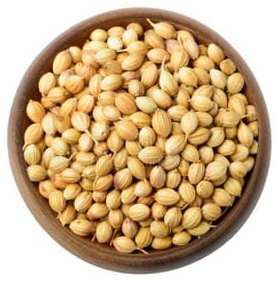
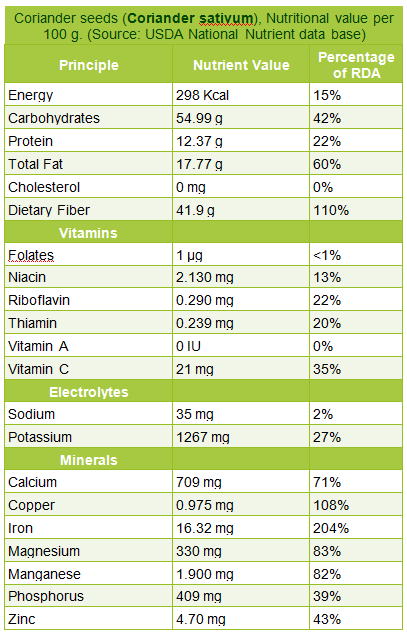

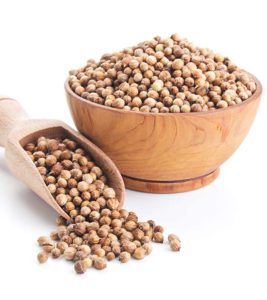
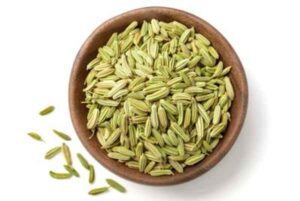
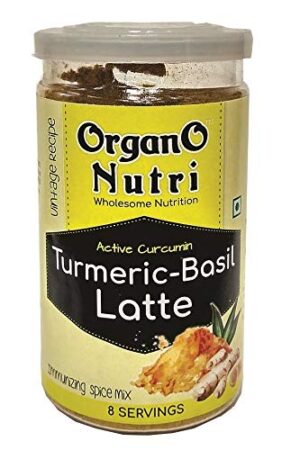
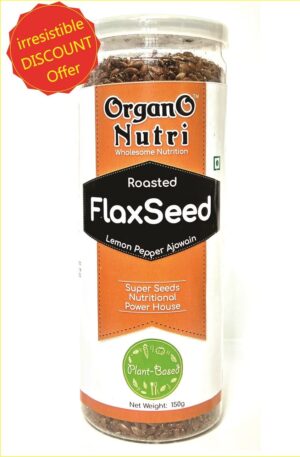
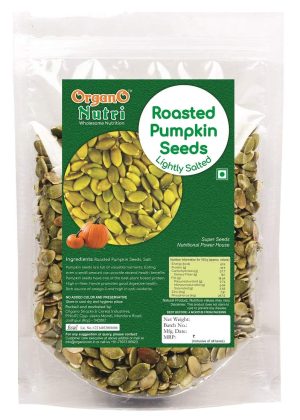
Reviews
There are no reviews yet.